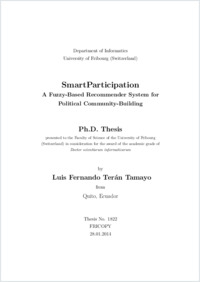SmartParticipation : a fuzzy-based recommender system for political community-building
- Terán, Luis
- Meier, Andreas (Degree supervisor)
-
28.01.2014
XXVI + 208 p.
Thèse de doctorat: Université de Fribourg, 2014
Logique floue
Systèmes de recommandation (informatique)
Participation politique
Participation des citoyens
Réseaux sociaux (Internet)
English
French
German
As the use of the Internet proliferates, so does the amount of information available. With the introduction of Web 2.0, which includes users as content generators, finding relevant information is even more complex. To tackle this problem of information overload, a number of different techniques have been introduced, including search engines, Semantic Web, and recommender systems, among others. Social networks and communities have become an important environment for exchanging information about products, services, music, and movies, among other things. In an information and knowledge society, such technologies could also improve democratic processes, increase citizens’ interest in political issues, enhance participation, and renew civic engagement. However, the difficulty of finding other citizens or parties that share common goals is still a barrier to overcome. In this work, a fuzzy-based recommender system architecture for stimulating political participation and collaboration is proposed. The SmartParticipation project uses the database of smartvote, a wellknown voting advice applications (VAAs) for local, cantonal, and national elections in Switzerland. The recommendation engine works with a modified fuzzy c-means algorithm (FCM) and the Sammon mapping technique, which is used for visualizing recommendations. Additionally, an evaluation framework for eParticipation is presented, which allows one to analyze different projects and their development towards the enhancement of citizens’ participation and empowerment. Initial results demonstrate the potential for building political communities and the stimulation of civic participation.
La popularisation d’Internet a graduellement accru la quantité de données disponibles. Avec l’apparition du Web 2.0, au sein duquel les utilisateurs sont également des créateurs de contenu, trouver des informations pertinentes est une tâche complexe. Dans le but d’aborder ce problème, un certain nombre de techniques ont été implémentées afin de faire face au risque de surcharge d’information. Parmi ces derniers on peut compter les moteurs de recherche, le Web sémantique, les systèmes recommandeurs. Les réseaux sociaux et communautés sont devenus un environnement propice à l’échange d’informations au sujet de produits, de services, de musique, de films, etc. Dans une société de connaissance et d’information, de telles technologies sont également à même d’améliorer les processus démocratiques, d’éveiller l’intérêt des citoyens pour la politique, d’augmenter la participation, et de donner un nouveau souffle à l’engagement civique. Toutefois la difficulté à trouver des citoyens ou des partis qui partagent la même visée est toujours une barrière à franchir. Dans cette étude, une architecture de système recommandeur basée sur une logique floue est proposée afin d’inciter à la participation politique et à la collaboration. Le projet SmartParticipation utilise la base de données smartvote, une voting advice applications (VAAs) répandue pour les élections locales, cantonales et nationales en Suisse. Le moteur de recherche recommandeur emploie un fuzzy c-means algorithme (FCM), ainsi que la technique de la mise en correspondance Sammon adoptée pour la visualisation des recommandations. Un cadre d’évaluation pour la eParticipation est en outre présenté. Ce dernier permet d’analyser différents projets, de même que leur développement en fonction du renforcement de la participation des citoyens et de leur prise de pouvoir. Les premiers résultats ont démontré un potentiel notable pour la construction de communautés politiques ainsi que pour la dynamisation de la participation civique.
Mit zunehmendem Wachstum und Verbreitung des Internets steigt auch die Menge an vorhandenen Informationen stetig an. Besonders seit der Einführung des Web 2.0 und der damit verbundenen Etablierung von Nutzern als Informationsquelle, wurde die Suche nach der richtigen Information im Web komplexer. Eigens zur Meisterung dieser Problematik wurden Lösungen Entwickelt, die in Form von Empfehlungssystemen, dem Semantic Web und Suchmaschinen auf dem Internet verfügbar sind. Soziale Netzwerke und digitale Gemeinschaften sind zu wichtigen Umgebungen mutiert, in denen Informationen über Produkte, Dienstleistungen, Musik, Filme und andere Produkte ausgetauscht werden. In solch einer Informationsgesellschaft ist es dementsprechend naheliegend technische Hilfsmittel einzuführen und bereitzustellen, die Bürgern darin helfen ihre demokratischen Rechte besser wahrnehmen zu können. Dadurch wird der demokratische Prozess verbessert und das zivile Engagement erhöht. Lediglich die Auswahl der richtigen Kandidaten bei einer Wahl ist eine Hürde, die es noch zu überwinden gilt. In dieser Arbeit wird ein Empfehlungssystem vorgeschlagen, welches auf Fuzziness basiert und dessen Ziel es ist den politischen Prozess und die Kandidatenwahl zu erleichtern. Das SmartParticipation Projekt nutzt Daten von smartvote, einem bekannten voting advice applications (VAAs) für lokale, kantonale und nationale Wahlen in der Schweiz. Das Empfehlungssystem arbeitet mit einem modifizierten c-means algorithmus (FCM) und der Sammon mapping zur visualisierung der Empfehlungen. Zusätzlich wird ein Evaluations Framework für eParticipation vorgestellt. Dieses ermöglicht unterschiedliche Projekte und deren Beitrag zur Verbesserung der Partizipation und Stärkung des demokratischen Prozesses auszuwerten. Erste Resultate zeigen auf, das grosses Potenzial im Bereich der Bildung von digitalen, politischen Gemeinschaften besteht und der Stärkung der Partizipation von Bürgern im demokratischen Prozess.
- Faculty
- Faculté des sciences et de médecine
- Language
-
- English
- Classification
- Applied sciences
- Notes
-
- Ressource en ligne consultée le 07.03.2014
- License
-
License undefined
- Identifiers
-
- RERO DOC 209654
- URN urn:nbn:ch:rero-002-112679
- RERO R007668409
- Persistent URL
- https://folia.unifr.ch/unifr/documents/303521
Statistics
Document views: 329
File downloads:
- Texte intégral: 562
